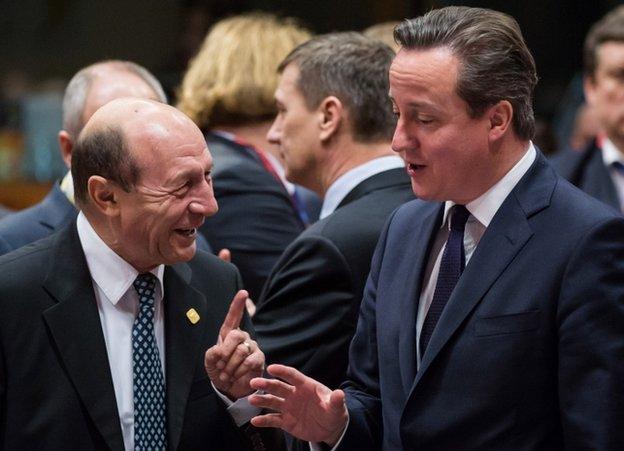Britain, the EU and a parallel universe
- Published
- comments

UK Prime Minister David Cameron (right) is seen here talking to Romanian President Traian Basescu in Brussels on Friday
EU summits increasingly have a curious quality to them. There is an official agenda, set out in draft conclusions, and then Britain's agenda. The two, quite frequently, are not the same. To scan the British media and then the rest of the European press would be to sow the doubt that we were not covering the same event. That is not always the case but it is often how it is seen in Brussels.
Take this week's summit. Defence co-operation was firmly on the agenda. It was the first time it had been discussed in five years. The draft summit conclusions had been available for two weeks and then 48 hours before the meeting, a row emerged like a sudden storm. Britain spied danger: that out of these talks an alternative military structure to Nato might emerge. UK officials were tasked with insisting on clear references to Nato being the bedrock of European defence.
So when Prime Minister David Cameron arrived in Brussels he said, "It isn't right for the European Union to have capabilities - armies, air forces and the rest of it - and we need to get that demarcation correct between co-operation, which is right, but EU capabilities, which is wrong." Many European officials were mystified because they did not believe the conclusions suggested a European army or that the Commission would somehow be owning drones.
This sense of a "parallel universe" was developed by Francois Hollande. He said that British fears of a European army were "un peu simule" or "somewhat fake". The French president went on to say that no one ever thought Europe as an entity was going to buy its own weapons and have its own army. He said there had been no need to have a debate about this "because there didn't need to be".
The British corner found a Commission document dating back to July which had mentioned "the possibility of EU-owned dual-use capabilities" in the defence area. And that had rattled cages.
But the Commission feels bruised and believes they are having to fight a succession of "red herrings" that originate in London.
'Abrasive British'
Others in Brussels have noted what they regard as the "abrasive" approach when British ministers come to town. Before he arrived in the Belgian capital, Attorney General Dominic Grieve had said he would not "shy away" from taking legal action if Brussels overstepped its powers. He accused the institutions of "seeking to reduce the freedom of action of some member states". Similarly, Home Secretary Theresa May, before stepping foot in Brussels, said, "We need to change the way free movement operates within the EU." That was seen as throwing down the gauntlet and one EU commissioner retorted "our EU rules are good and they are here to stay".
It is not that some of these concerns are not raised elsewhere. The Germans, the Dutch and the Austrians are worried about "benefits tourism". The Germans also question whether Brussels is taking too much power. It is rather a view that Britain is pursuing its own agenda which, when observed through Brussels goggles, sets it apart from other countries.
The summit gave full support to a banking union, the details of which were agreed by finance ministers mid-week. This is regarded as a major step towards further integration and supporting stability of the euro (there are quite a few countries like Italy which doubt the agreement actually does what it promises in terms of providing a back-stop if banks get into trouble).
A senior European official noted that David Cameron had not contributed to this debate. On the one hand that is not surprising. Britain will not be joining the union or contributing to the fund to wind up banks. But banking union underlines a wider truth: much of the European Union and the UK are heading for very different destinations.
I heard a senior EU official saying, "We don't yet have true economic union... we need something more." In this vision, a deeper economic union would address the disparities between national economies, reducing the different levels of competitiveness and productivity.
Now, undoubtedly, there is reform fatigue after three years of fighting an existential threat to the European project but for many countries "ever closer union" remains the mantra. Deeper integration is coming. The view from inside the European Commission is that they would like to see Britain at the centre of the European debate "but just saying 'no' is not a very constructive way of being assertive".
British officials say they are only fighting for British interests and they have much wider support in raising these issues than is always apparent, and that is true. It is also the case that the Commission can be so focused on building the architecture of European institutions that they do not see they very real risk that they are presiding over a jobless recovery. But at a critical point for Britain, keen to re-negotiate its terms of membership, there is the perception, right or wrong, that the UK often exists in a parallel universe when it comes to the European sphere.